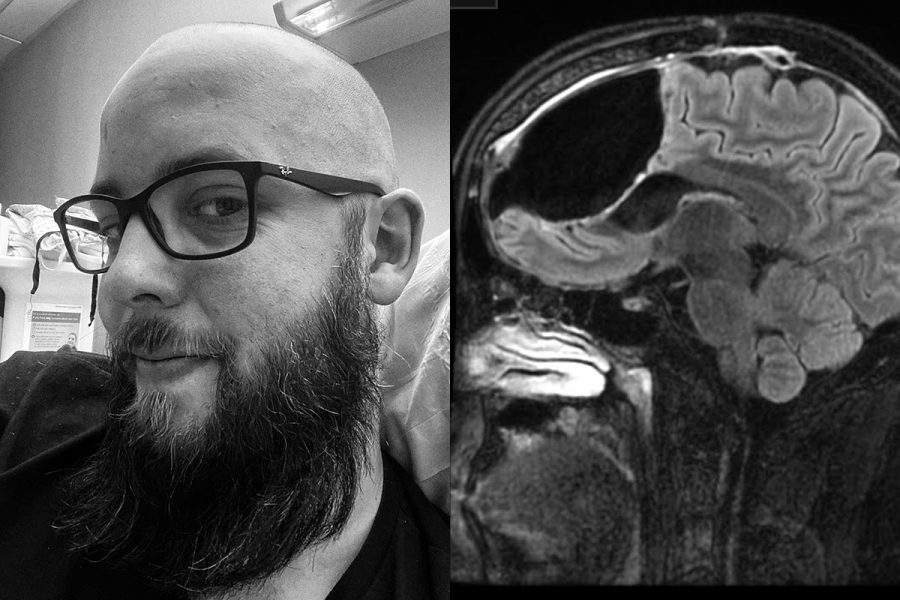When crisis strikes on tour, experienced production designers like Luke Edwards can typically troubleshoot most problems and come up with a swift solution. On 23 October 2020, however, things were different. After suffering a seizure and being subjected to various CT scans, EEG and MRI tests, he eventually found his life left in the capable hands of a neurosurgeon. “I will never forget the words of the consultant: ‘You better call your partner here, as it is not good news, I’m afraid.’” He and his wife, Megan, who was not in the room due to COVID-19 protocols, were informed that Edwards had a tumour “the size of two tennis balls” in his brain.
Some 12 months later, having undergone major, life-changing surgery to give himself the best chance of recovery, Edwards cut a figure of optimism as he mingled with some familiar industry faces at London’s PLASA Show. “Looking back at the initial scans, I still can’t believe the neurosurgeons were able to remove a tumour of that size from my brain without compromising who I am, how I move or speak,” he said, praising the surgeons responsible for successfully removing most of the tumour. “While I will never be ‘cured’, the odds that my tumours will turn cancerous have decreased significantly,” he explained.
Prior to the surgery, Edwards was informed there was a slight chance he would permanently lose the ability to speak and be temporarily or permanently paralysed on the right side of his body. With lots of major risks to contend with, pragmatic as ever, Edwards refused to sit on his hands. “I can’t control the fact that I have a brain tumour – the only thing I can do is go through this process as positively as possible,” he said, with the confidence of a man who cannot be beaten.
Throughout the process Edwards, who has toured the world over, making meaningful connections along the way, was inundated with well wishes on social media. “You often forget or take for granted the impact you have on people and the world around you. It isn’t until something goes horribly wrong that you realise how many people care about you,” he said, having shared his journey on social media while raising awareness and funds for The Brain Tumour Charity along the way. “Although I have been dealt a bad hand, I have also been handed an opportunity to raise awareness and ensure other people don’t go through it alone.”
Prior to COVID-19, Edwards spent 200 days on the road, racking up 95 flights. “If lockdown has taught me anything, it’s that I like sleeping in my own bed every night and being at home with my wife,” he chortled. Thankfully, his new role as Marketing Manager at Collaborative Creations (CC) allows him to do just that. “One of the reasons CC wanted to employ me was my experience on the road, and they were looking for someone with sector-specific experience in marketing. They’ve been really supportive and helpful throughout this entire rehabilitation process, regularly checking in on me to see how they can improve the working dynamic,” he said, praising his new employers.
In September, Edwards returned to the road to fulfil his duties as Lighting Designer for Jacob Collier, for a string of shows, a year after advancing for the original tour in Siyan’s warehouse and 12-hour brain surgery. “It was great to be around people again. It felt as if I had come full circle. I was in Siyan’s warehouse preparing the kit to go on the road when I received the call that the tour was cancelled due to COVID-19,” he furthered.
“The touring camp was great and really supportive. My decision was based on a mixture of testing my body and pushing my limits post-surgery – I certainly do not miss jet lag!” he laughed, reflecting on the experience.
Having gone through the ringer, Edwards was unapologetic about his desires for the future. “I was this close to losing everything. This is something that I am going to have to deal with for the rest of my life, so I’m doing what’s good for me now, which is one of the main takeaways for me.”
His advice for others is to “appreciate the little things in life and things that make you happy”, he said, adding that finding pockets of time to do what you are passionate about is the key to his rehabilitation process.
“Realising that I have an incredible wife at home and going for a walk on a Saturday afternoon is one of the things I feel grateful for, but it was something I took for granted. My work-life balance before this year was horrible; I was away for two-thirds of the year,” he said, grappling with his new ‘work-life balance’. “Lockdown taught me to spend more time at home. In the past, I’d have said yes to a lot of things to make money but that’s not the most important thing in life. You can survive by saying ‘no’ to a tour,” he explained.
Now taking it one day at a time, Edwards is focusing on spending time with friends, family, and colleagues, and recovering from the most challenging year of his life.
“I’m happy and grateful every morning I wake up to be alive.”
This article originally appeared in issue #266 of TPi, which you can read here.
The Brain Tumour Charity depends on voluntary donations to fund research, to keep striving for faster diagnosis times and to offer support for people affected by brain tumours.

